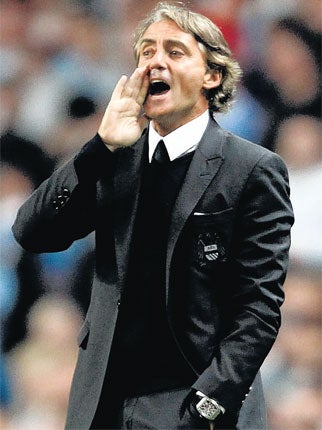James Lawton: Europe's top table provides a harsh reality check for Mancini
Napoli were waiting to spring an ambush and when it arrived early in the second half it was surely Mancini's worst nightmare

Roberto Mancini has always said – and he should know better than most – that Europe is a place you do not invade. You put down your feet with a degree of circumspection – and then you learn on your feet.
Last night, if anyone doubted it, Napoli asserted this reality with some brilliant flair.
For City it was more than a learning curve. It was an extremely pungent taste of the rest of their football lives.
Mancini had his father's presence in the stands and, apparently, inevitable criticism whatever happened on his return to the Champions League theatre which has always represented the final challenge to his status as a leading football man.
For the sweet harmony of a devoted Italian family, though, it seemed quickly enough to have never been more imperative that the old patriarch Aldo choose his words with special care. In all the pressure his son has faced over the last two years, this was surely the ultimate: landfall in the place to which all the money and the building and the dreams had been directed.
The highest level of the European game though has rarely done Mancini too many favours, even as a serial title winner at Internazionale, and once again he encountered a rocky shoreline. Napoli, the team who like City were taking their first strides in the big league after seasons of impressive renewal on the domestic front, were waiting to spring an ambush and when it arrived early in the second half it was surely Mancini's worst nightmare.
It was a goal stamped most favourably in the psyche of any Italian football man. It was the goal of the counter-attack as withering as we have seen conjured from the thinnest of air.
Christian Maggio burst out of his lines, which had been repulsing City's increasingly desperate attacks with increasing comfort, with wonderfully single-minded purpose. As he bore down on Joe Hart's goal he had two options. Unerringly, he chose the right one, Edinson Cavani, one of Napoli's clutch of assassins who do their best work on the break – and to the extent of scoring 43 of the 59 goals on the way to last season's Serie A third place.
Cavani put the ball past Hart as though it was the easiest thing he had ever been asked to do, something his ally Ezequiel Lavezzi had earlier suggested when he left the admirable Vincent Kompany for dead before smashing a shot against the cross-bar. This was not the kind of thing that might have been completely anticipated after City's urgent and often brilliant start to the Premier League season.
But then, of course, that was the Premier League and this was where the great reputations are made and the strongest nerve is rewarded. Perhaps no one in the football universe is better aware of this reality and he could hardly have breathed more deeply when Kompany redeemed himself with the perfect sense of danger while stopping a Napoli shot on his line.
This level of doubt did not seem the likeliest prospect in the early going, when David Silva and Sergio Aguero, particularly, suggested that they were about to say that the early season plaudits were nothing more than their due.
Aguero seemed especially motivated for fresh acclamation. This was not least when he moved beautifully in tandem with Yaya Touré before playing the big man in to the position to smash a drive against the cross-bar. He then hit the woodwork himself after some beautiful movement at the edge of the box.
But, no, Aguero could not conjure quite the level of touch and ingenuity that overwhelmed the likes of Swansea City and Wigan Athletic. Nor, certainly, could Samir Nasri, whose gifts were worryingly obscure on his best opportunity so far to remove fears that for all his skill on the ball, all his inventions, he has thus far to establish himself as a man for the most challenging moments.
Unsurprisingly in all the circumstances, Mancini turned to his old saviour – and potential nemesis – Carlos Tevez. Inevitably, Tevez brought stirrings of City defiance in the face of a shuddering arrival in the Champions League, something to haunt the older City fans as much as the pratfall in Istanbul when the 1968 English champions fell at the first time of asking in the European Cup.
A kind of salvation came when Alexander Kolarov drove home a beautifully flighted free-kick. It was not quite what Mancini had in mind – and probably didn't earn him too many plaudits over the family supper table – but at least it averted the ultimate disaster. City had promised the world but in the end they at least preserved a little corner of it. However, it was a place not of dreams but an extremely harsh reality.
They now hardly need telling that Europe remains a place capable of asking the most embarrassing questions.
Join our commenting forum
Join thought-provoking conversations, follow other Independent readers and see their replies
Comments